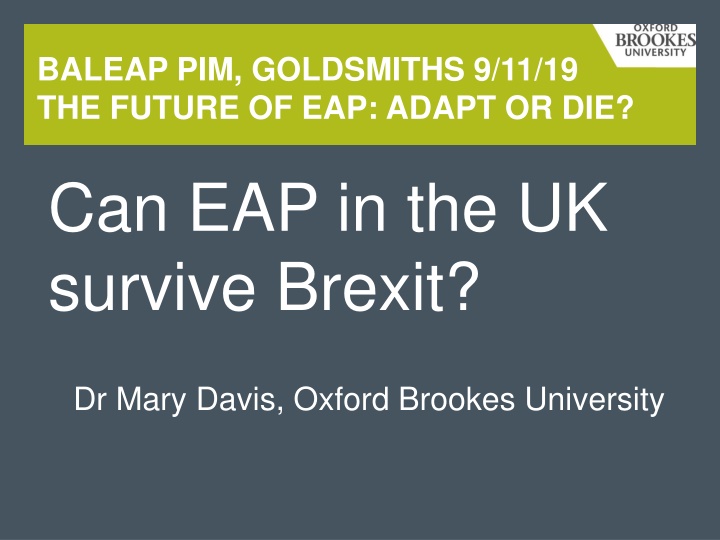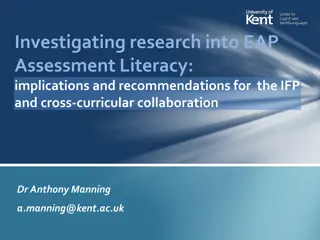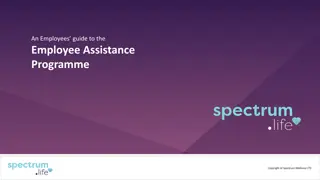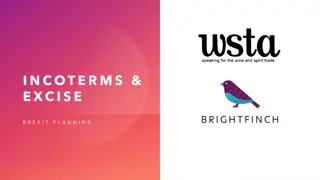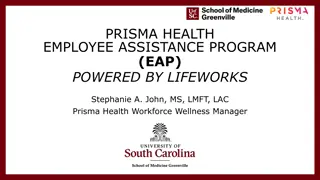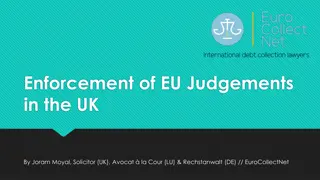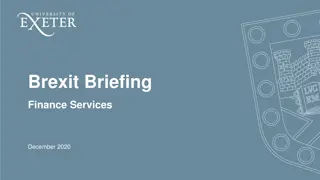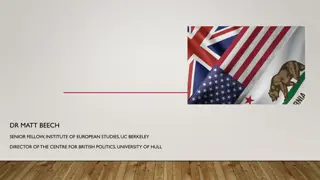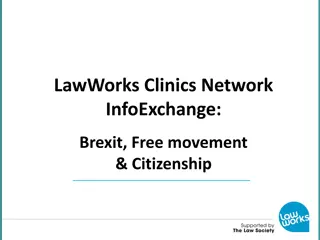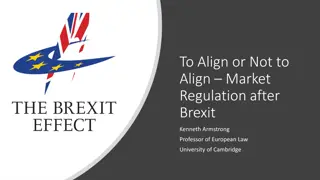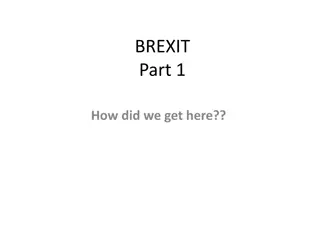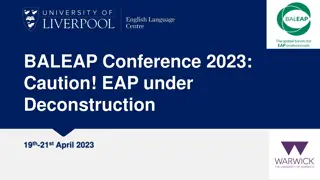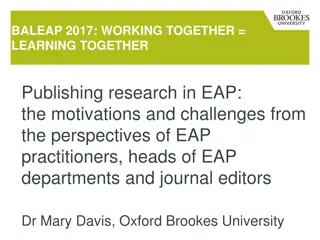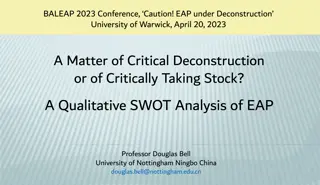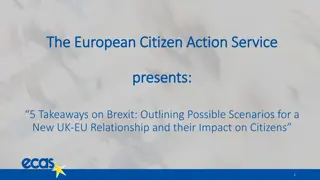Challenges Facing EAP in the UK Post-Brexit
The future of English for Academic Purposes (EAP) in the UK is uncertain due to the potential impacts of Brexit. Decreases in EU student enrollment, loss of academic talent, and challenges in recruiting international staff pose significant risks. Competition from other countries and the shifting landscape of international education add complexity to the situation. EAP practitioners are particularly vulnerable to fluctuations in the overseas student market, highlighting the need for adaptation and resilience in the face of changing circumstances.
Download Presentation

Please find below an Image/Link to download the presentation.
The content on the website is provided AS IS for your information and personal use only. It may not be sold, licensed, or shared on other websites without obtaining consent from the author.If you encounter any issues during the download, it is possible that the publisher has removed the file from their server.
You are allowed to download the files provided on this website for personal or commercial use, subject to the condition that they are used lawfully. All files are the property of their respective owners.
The content on the website is provided AS IS for your information and personal use only. It may not be sold, licensed, or shared on other websites without obtaining consent from the author.
E N D
Presentation Transcript
BALEAP PIM, GOLDSMITHS 9/11/19 THE FUTURE OF EAP: ADAPT OR DIE? Can EAP in the UK survive Brexit? Dr Mary Davis, Oxford Brookes University
ADAPT OR DIE? Adapt or die? How the Conservative party keeps power (Observer, 3/11/19) Adapt or die? The importance of adapting to change in business (Customerthink, 2019) Adapt or die? Can evolution outrun climate change? (CBSN, 2018) It is not the strongest of the species that survive, nor the most intelligent of the species that survive. It is the one that is most adaptable to change (Charles Darwin, 1859)
HEADLINES FOR UK HE 50% of institutions have experienced a fall in numbers of students from the EU and 60% have lost staff to overseas institutions (Universities UK, 2019). Connections with the EU through Erasmus+ and European research funding are being eroded, and changes in fees for EU students are likely from 2021 (Universities UK, 2019). The consequences of Brexit in terms of the hostile environment , the rise of nationalism and xenophobic attitudes in the UK have made it more challenging for universities to appeal to overseas students (Guardian, 2019)
MORE RISKS OF BREXIT UK HE risks losing its status as a collaborator of choice in vital research The UK will lose existing academic talent from the EU Universities will experience sudden, steep declines in EU student enrolments (Universities UK, 2019) International staff made up 30% of all academic staff in 2017 (Universities UK, 2018)
COMPETITION FROM ELSEWHERE Numbers of international students are stagnating overall in the UK, despite the global number increasing (Juub, 2018) Development of European English new English to use as lingua franca in EU politics and education (Seidlhofer and Widdowson, 2017) German universities may benefit most as central research partner and provider of courses taught in English (Education Journal, 2018)
CONSEQUENCES FOR EAP IN THE UK Any fall in overseas students can have significant impact on EAP practitioners, as their core work is likely to rely on the international market. Drops in EU and other non-UK student numbers hit EAP practitioners harder, because of their uncertain status in institutions, working on temporary contracts and doing seasonal work (Ding and Bruce, 2017). Many pre-sessional programmes also rely on recruiting EU-based staff based on job adverts and comments, it is becoming more difficult to recruit them.
EAP AND BREXIT - WORKSHOP Aims: to provide an opportunity for critical debate on Brexit and EAP to attempt to develop recommendations for EAP practitioners to find creative ways of working despite the UK s current political environment.
QUESTIONS TO CONSIDER: HOW WILL BREXIT IMPACT EAP? How will Brexit affect you directly? How will it impact your university? How will it impact the programmes you work on? How will it impact your students? How will it impact your work opportunities?
WHAT CHANGES ARE NEEDED? HOW CAN THE IMPACT BE MITIGATED? What changes will you have to make to your work? What changes will you have to make to your programmes? What changes will happen with your students? What changes will happen at your university? What can you do to mitigate the impacts and changes?
RECOMMENDATIONS (FROM WORKSHOP) Get involved in university strategies (eg widening participation, inclusivity, internationalisation) Refocus EAP as academic skills for all Expand your own role beyond EAP
REFERENCES Adams, R. (2019) EU students could face higher fees to study in the UK from 2010. Guardian, 28/4/19 Available at https://www.theguardian.com/education/2019/apr/28/eu- students-could-face-higher-fees-to-study-in-uk-from-2020 Ding, A. and Bruce, I. (2017) The English for Academic Purposes Practitioner: Operating on the edge of academia. Cham, Switzerland: Springer International. Education Journal (2018). German universities likely to benefit from Brexit. 331, 7 Juub, E. (2018). You say stability, I say stagnation. Universities UK https://www.universitiesuk.ac.uk/blog/Pages/You-say-stability-I-say-stagnation.aspx Seidlhofer, B. and Widdowson, H. (2017). Thoughts on independent English. World Englishes, 36(3), 360-362. Universities UK (2018). How can the government ensure universities are best placed to maximise their contribution to a successful and global UK post-EU exit? Available at https://www.universitiesuk.ac.uk/policy-and-analysis/reports/Pages/policy-priorities- post-exit.aspx Universities UK (2019). Majority of universities well prepared for no-deal Brexit, but continue to fear negative impact. Available at https://www.universitiesuk.ac.uk/news/Pages/Majority-of-universities-well-prepared-for- no-deal-Brexit;-but-continue-to-fear-negative-impact.aspx
